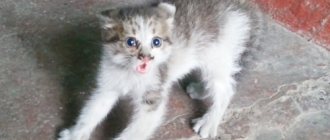Pets age much faster than we would like. Statistically, a cat over 8 years old is considered elderly; in fact, many purrs live a full life until they are 12–13 years old. Ages over 17–18 years are considered longevity. Some pets live up to 20 years. It all depends on the care, heredity and life path of the pet. Let's figure out how to care for an old cat to prolong its life.
Among cats there are also record holders for longevity. Unfortunately, there is no documentary evidence of this story, but one of the notes of an English traveler contains a very interesting story. A man writes that he found a kitten and gave it to his friend. The next meeting with a friend took place 40 years later and she appeared at the door with that same cat. A case of longevity of a cat has been officially registered in Devon (also England). An ordinary tabby cat lived there for 34 years. There are many more confirmed cases of cats living up to 20-25 years of age... which is 92-104 years of age by human standards.
Wash your cat less often
Cats generally do not need to be washed particularly, unless they are hairless, in which case if they are dirty, for example, in their folds, it is recommended to bathe them once a month. It is better not to torture furry cats, and if necessary, do this no more than once every three months. If the cat gets dirty, wash only a specific area, use a damp sponge. It is better to leave older pets alone and not expose them to unnecessary stress. Especially if the cat does not tolerate bathing well.
Read about how to properly bathe a cat and kitten.
Constantly fill your pet's bowl with food
Half of all domestic cats are overweight or obese. And all this is due to the fact that caring owners immediately fill their pets’ bowls as soon as they are empty. This can lead your cat to overeat, especially if she eats too many carbohydrates. To avoid this, fill your pet's bowl two or three times a day.
Children love my signature fish soufflé cupcakes with cheese (recipe)
The granddaughter of Mikhail Ulyanov and Alla Parfanyak grew up to be a spectacular woman (photo)
A building made of porous bricks was built in Iran. How it is lit inside (photo)
Don't overfeed your cat
An abundance of food, especially from the master's table, leads to obesity, problems with the liver and stomach. The cat's belly should not hang, this is a bad sign. If you see that your pet has problems with this or has indigestion, diarrhea, etc. contact your veterinarian, he will tell you what to do. And if you feed your pet from the table, and his diet contains salt, spices, chocolate, etc. harmful products, take him to the doctor immediately. Even if everything is fine with him so far, it is better to prevent the consequences than to deal with them later. In any case, keep in mind that feeding a cat from the table is strictly prohibited; switch your (especially older) pet to super premium or holistic food for older cats, or to natural food. And don’t delay visiting the veterinarian, he will tell you exactly how to feed your cat.
Also read:
Products harmful to cats.
Review of the best industrial food for cats and kittens.
How to extend the life of your beloved cat? Useful tips
Contents hide
Make your home furry-friendly . “Think Like a Cat” is not just the title of a bestseller. If you like, it's a lifestyle. Try getting on all fours and critically examining your home. Try to look for dangerous temptations: loose wires, household chemicals, dangling curtains... Did you see everything? Now try to fix it!
Spay or neuter your furry friends. According to Banfield Pet Hospital, neutered cats live on average 62% longer than their non-neutered counterparts. Sterilized cats – by 39%, which is also not bad. Surgeries will allow you to avoid many dangerous diseases, and behavioral problems will disappear into oblivion. Or they'll almost leave!
Provide cats with clean, fresh water. Cats need to drink a lot (especially when their diet is based on dry food). Give your kidneys a job! Use various tricks (for example, drinking fountains). Or switch to wet food.
Give only high-quality and balanced food. It is not at all necessary to choose the most expensive food from the range available for sale! We advise you to first visit a veterinarian and consult with him. And just follow the specialist’s recommendations. However, remember: saving on feed quality is a bad saving!
Maintain your pet's normal weight. It would be nice to track weight over time - periodically weigh the animal and record the results. Don't forget: the share of treats and treats in the diet should be no more than 5-10%.
Make friends with your veterinarian. The veterinarian will become a good friend and faithful guardian angel for your pet for many years to come! Try to immediately choose a good, understanding specialist who sincerely loves animals. Make personal contact, ask for his mobile phone number. A lot of questions arise, and you won’t immediately drop everything and go to the clinic! It is always better to get prompt advice from a specialist than to do something wrong in the first place.
Don't neglect brushing your pet's teeth and caring for the oral cavity. Not the most pleasant procedure, but vital. Brush your pet's teeth at least twice a week. Don’t neglect having your teeth professionally cleaned by a veterinarian-dentist (let’s face it, it’s a rather expensive service).
Home maintenance is the key to longevity. Of course, many owners are happy to let their pets outside. And such content has its advantages. But stubborn statistics say that “street” pets live an order of magnitude shorter than their “domestic” counterparts. Everyone knows how many dangers the street is fraught with. For comparison, today's domestic cats live on average 15-16 years. Their street counterparts are approximately 5 years old. No comments!
Be sure to have your cat microchipped. I love it – both street and indoor. Just in case.
Provide leisure for your pet, think about its diversity. Buy a variety of toys. Give your cat access to a windowsill, balcony or loggia. Close your eyes and splurge on “cat town.” Don't forget: a bored cat can turn your cozy apartment into ruins!
Brush your pet regularly (depending on the length of its coat). Don't skimp on the quality of the tool. This is the best prevention for the appearance of “wool balls”!
React to the slightest changes in behavior. Cats love once established order of things, routine. Sudden changes in behavior, habits and habits almost always indicate a problem. Maintain direct communication with your treating veterinarian!
Choose your cat’s “friends” and “companions” carefully and meticulously. There can never be too many cats! But mustaches are delicate animals, and many don’t really like to share their personal space with someone else. The best way out is to immediately take kittens from the same litter. Otherwise, introducing two cats is a whole ritual. Do everything gradually, in stages, with lots of affection and positive reinforcement.
Caress and stroke your pet every free minute. And at the same time, see if everything is okay with him - if there are any bald spots, ulcers, sores, suspicious lumps, etc.
Pamper your cat from time to time! Give free rein to your feelings. At such moments, a strong relationship is formed between you and your pets. It is not for nothing that magical properties have long been attributed to cats. Modern science has confirmed: communicating with a furry pet will prolong the life of both of you!
Original publication : 15 Tips That Could Lengthen Your Cat's Life. Source: cuteness.com Photo: pixabay.com
Balanced diet
For a cat to feel good, its diet must contain all the necessary nutrients. Therefore, it is important to select the best option for purchased food or prepare special homemade food for your pet.
Do not forget that you cannot mix different types of diet, since the animal’s gastrointestinal tract adapts to one type of food. It is also not recommended to overfeed the cat or give him leftovers from the human table. This food contains many components that are harmful to pets and can cause health problems.
Asylum
All cats need a shelter or a place to hide and feel safe. Most “shelters” are in the form of a box, house or carrier; they need to be located in a place far from busy traffic and active activities of family members. This should be a place where your cat can go and rest peacefully, feeling completely safe. This is especially important for busy households, families with dogs or multiple cats.
A convenient location for a cat house, with a small soft resting area, is on the top of a closet or chest of drawers. It should be high enough so that the animal feels safe and can calmly observe its environment. Remember, the location needs to be in an area where the dog can't disturb your cat, and if you have more than one (cats), multiple houses will be needed.
1.High-quality and convenient cat litter
Cats, photo - lovers of a clean toilet, so its contents should be cleaned and dirty ones replaced every day, and sometimes more often. The texture and type of bedding that best suits your cat's needs should be used.
The cat litter box should be located in a place where the cat will feel safe and no one (especially if there are dogs in the house) will disturb it. It should be a large, open box with high sides. The ideal choice is a plastic toilet.
Visual stimulation
Every cat should be able to look out the window and observe what is happening there. Ideally, next to the porch, but if this is not possible, then just by the window, and if it’s soft and comfortable there, like on a bed, then that’s just wonderful. If possible, consider placing the feeder in a window opening, which is great if the windows are large and there is plenty of space on the windowsill.
Don't go to the vet
Even healthy cats should visit the veterinarian at least once a year. Almost all pets experience fear of veterinarians, and this is understandable; a stranger, an unfamiliar environment - all this causes stress in a cat. However, you don’t need to follow the lead of your four-legged roommate; try to take him to the doctor at least once a year. There is a chance that he may notice kidney disease, diabetes, or some kind of inflammation. All of these diseases can be cured or prevented if detected early.
Common care mistake: planting hydrangeas in the shade of trees
Freezing Peaches: Drizzled with Lemon Juice Will Keep Peaches Longer
A simple underground cooler for drinks from water pipes: instructions
Record-breaking cats for life expectancy
Among all the rules there is always an exception. Such exceptions sometimes include cats, whose life length goes beyond the limits provided by nature. Such centenarians are included in the Guinness Book of Records. First place was unconditionally taken by the oldest cat named Puff: 38 years of cat life. There lived a cat grandmother in Texas.
global $ads_google; //data-ad-slot=”2475549904″ $ads_google = empty($ads_google) ? false : true; ?> if ($ads_google == false) {?>
$ads_google = true; ?> } ?>
Also interesting is the cat, who was born at the beginning of the 20th century, in 1903, and lived happily in the southwest of England for 36 years. He died the next day after his last birthday.
Several more cats were among the record holders; one feline was 30 years old, the other was 23. Today, the longest-living cat among the meowing cats lives in Melbourne, Australia, and goes by the name Catalina. The Burmese beauty began her life in the 20th century and is 35 years old this year.
So the formula for long life for cats consists of the following set of factors: a loving owner plus health care plus the qualities of the breed.
You need to monitor your cat's well-being
It will not be difficult for a good owner to notice when a cat’s appetite is impaired, lethargy, peeling or discharge from the eyes appears. In any of these cases, you should immediately visit a veterinarian. Even the most minor illness in a cat can take away a lot of vital energy and strength.
You shouldn’t be embarrassed or spare money for an unexpected visit to a doctor who treats cats. This often allows you not only to find out the general condition of your pet, but also to detect hidden diseases in advance, begin to treat it on time or get some vaccinations. Veterinarians will also more accurately advise the correct food for the cat, which will be suitable for its breed or age.
Attention and love
Despite the independent nature of cats, they require the attention and love of their owner. If your pet is deprived of this, his mood and appetite may worsen, which, in turn, will lead to various diseases and weakened immunity.
In addition, animals (like people) can develop somatic diseases. Such illnesses arise against the background of emotional problems, so they are especially difficult to cure. Therefore, before getting a cat, decide for yourself whether you are ready to give it the necessary amount of attention and love.
A cat, like any pet, needs careful care and attention from its owner. Therefore, get ready for the fact that to improve the length and quality of life of your furry pet, you will have to spend a lot of time and effort.
How long do cats live at home?
It is obvious that cats live longer at home, and their lives are much more pleasant than if they led a half-starved existence on the street. The usual life expectancy ranges from 10 to 20 years. It depends on the breed and living conditions.
global $ads_google; //data-ad-slot=”2475549904″ $ads_google = empty($ads_google) ? false : true; ?> if ($ads_google == false) {?>
$ads_google = true; ?> } ?>
Of course, if the breed is not predisposed to hereditary diseases, then the meowing pet will please its owner longer. The animal's activity will gradually decrease; cats that are approaching the 10-year mark become calmer and prefer a warm, quiet place to noisy fuss.
More often, the answer to the question “how long do domestic cats live” depends on the attentive care of the owner and timely vigilance regarding the cat’s health.










